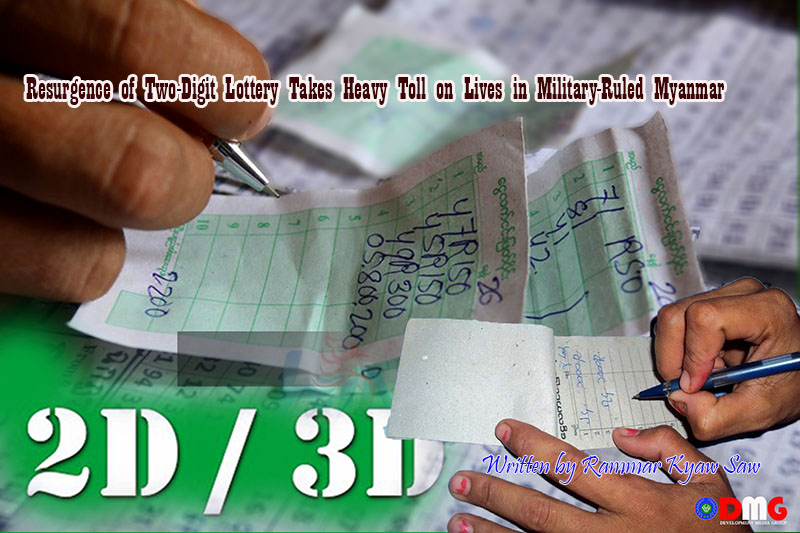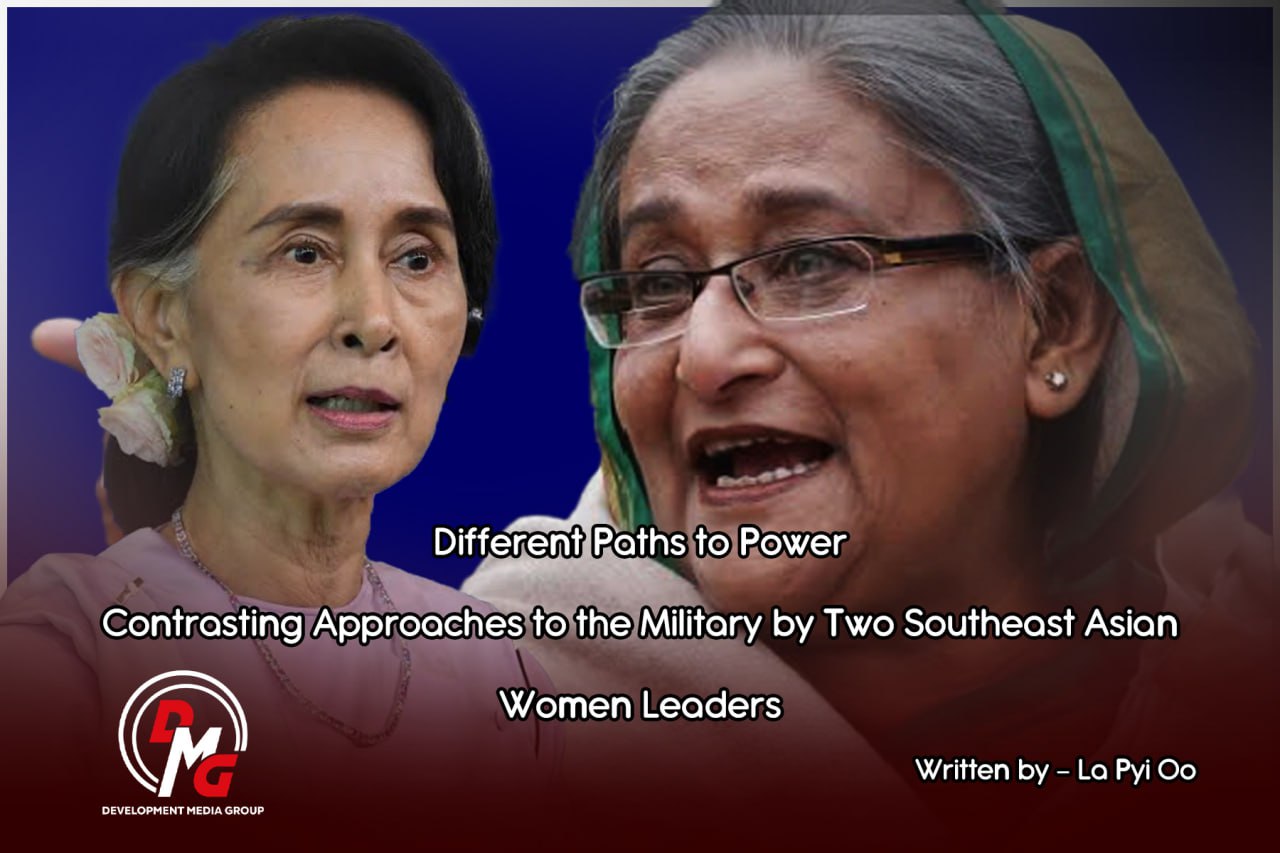- AA-led forces clash with regime near strategic Nat Yay Kan base in Ngaphe Twsp
- Five murder cases recorded in Arakan State over six months
- Weekly Highlights from Arakan State (Jan 12-18, 2026)
- Arakan Army denies junta claims of drug involvement
- Water shortages hit nearly 2,000 displaced people in Ponnagyun
Resurgence of Two-Digit Lottery Takes Heavy Toll on Lives in Military-Ruled Myanmar
Usually, police and administrative officials are bought by illegal lottery dealers. Myanmar Gabling Law carries three years’ imprisonment for selling two-digit and three-digit lottery tickets, but dealers are barely punished due to widespread corruption at the lower levels of the administration and law enforcement.
09 Nov 2022

Written By Rammar Kyaw Saw
Today, much of Myanmar including Arakan State is facing a wave of crimes due to post-coup political turmoil, rampant inflation and soaring costs of living.
To bridge the gap between their incomes and expenditures, many people are looking for ways to acquire large sums while investing little. Gambling. It gives people the false impression that they can earn easy money. They bet on football matches and two-digit and three-digit illegal lotteries.
To play the three-digit lottery, lottery ticket vendors use the last three-digits of the Thai National Lottery, which is held once every two weeks. The winner gets 500 times the amount he paid for the ticket. But there is little chance to win. As it can only be played twice a month, it does not have as devastating an effect on players as two-digit and football betting do on gamblers.
And football betting causes more serious impacts on gamblers than two-digit illegal lottery. The Two-digit lottery became popular in our region around 2000. At the time, a two-digit lottery could be played only five days a month. The last two digits of the five-million prizes of the Myanmar government’s Aungbarlay lottery were used as the winning numbers. In the past, the Myanmar official lottery was opened every month, for five consecutive days, announcing the winning numbers every day through the radio. The jackpot is sizable as winners get 80 times the amount he paid for the ticket. But players only have one percent of chance to win.
The Myanmar government then changed the Aungbarlay lottery system, announcing all the winning numbers in a single day, making it impossible for two-digit illegal lottery dealers to play. The lottery dealers came up with a more brilliant way to keep their business running, using the Stock Exchange of Thailand for their illegal lottery. Here, the last two digits of the closing SET index is chosen as the winning number of that day, enabling dealers to play five days a week or 20 days a month. This is worse than before, and players suffered heavier losses as they bet and bet again to recover their losses. Some lost all of their savings and had to pawn their houses, while some couples separated because of rows over losing so much money.
These things happened when a two-digit lottery could be played 20 times a month. Today, it can be played two times a day on weekdays and 40 times a month. So one can imagine how much more gamblers are losing.
Usually, police and administrative officials are bought by illegal lottery dealers. Myanmar Gabling Law carries three years’ imprisonment for selling two-digit and three-digit lottery tickets, but dealers are barely punished due to widespread corruption at the lower levels of the administration and law enforcement.
And in most cases, only small bookmakers or those who sell tickets on commission were arrested, and large bookmakers remain at large.
As the gambling law allows police to arrest bookmakers without a warrant, it is necessary for bookmakers to bribe police officers. The two-digit illegal lottery has regained popularity only recently after it sank into obscurity for nearly a decade.
The popularity of three-digit and two-digit illegal lotteries steeply declined when the top prize of government Aungbarlay lottery was increased from K150 million to K500 million under the U Thein Sein government as people preferred to buy Aungbarlay lottery.
During the NLD government led by Daw Aung San Suu Kyi, the maximum prize money for the state lottery was awarded K1 billion and K1.5 billion, so the number of people who buy Aung Bar Lay lottery tickets increased, and two-digit gambling almost disappeared.
After the military coup, the amount and number of prizes for state lottery were suddenly reduced, so double-digit gambling has revived. People have had less interest in the state lottery as the top prize was reduced from K1.5 billion to K500 million. In opposition to the military coup, the people boycotted all businesses that could generate tax money for the military, so the sales of state lottery tickets, which had reached the highest level, plummeted, and even the highest prize of K1 billion, which had previously been awarded, was no longer awarded, but only K500 million.
People are paying more attention to the illegal gambling side, and in some villages we are seeing double-digit gambling leading to some people having to mortgage their farms and sell their cattle. You will also see two-digits being sold openly everywhere in urban areas. Bookmakers have been conducting illegal gambling together with relevant officials in rural areas where the military council’s administrative mechanism is not within reach.
Most of the two-digit gamblers are grassroots workers. The grassroots people play with the hope that if they win a two-digit lottery from their meagre income, they will be able to eat a good meat dish and meet the necessary kitchen expenses, and this illegal lottery will become a lucrative source of income for dealers.
That’s why bookmakers can give up to 12-13 percent of the sales to the commission sellers. Even those with low incomes continue to play double-digit gambling in the hope of earning a little extra money.
Another is the issue of paying bribes to the police, a term that is widely used in underground gambling. This phrase is most often heard from pimps, illegal liquor sellers, smugglers, illegal pawn shops, and bookmakers. I think that this is not a formal payment as a tax, but rather an indication that there is bribery at the bottom.
The ancestors said that gambling is the beginning of immorality. However, even though everyone continues to gamble because they are not free from greed, it is likely to be reduced to some extent if the officials can maintain and enforce it.
Although the concerned officials may ignore this two-digit lottery, which people have been playing until they mortgage their houses and farms, if ULA/AA can take control measures only in their jurisdictions, it is likely to change in some way.
If we can only take action against the dealers who do various kinds of gambling, including the two-digit lottery, as we did against WY stimulant tablets users and those who gambled in the past, there is a possibility that gambling will disappear in rural areas.
If there is gambling, there will always be gambling-related crime in a country. As the lower classes are giving priority to gambling due to poverty and insufficient income, not only the consequences of gambling, but also the possibility of facing crimes such as robbery and murder, I see that it is still a matter of desperate need for the relevant administration and management to tackle it in time.




.jpg)















